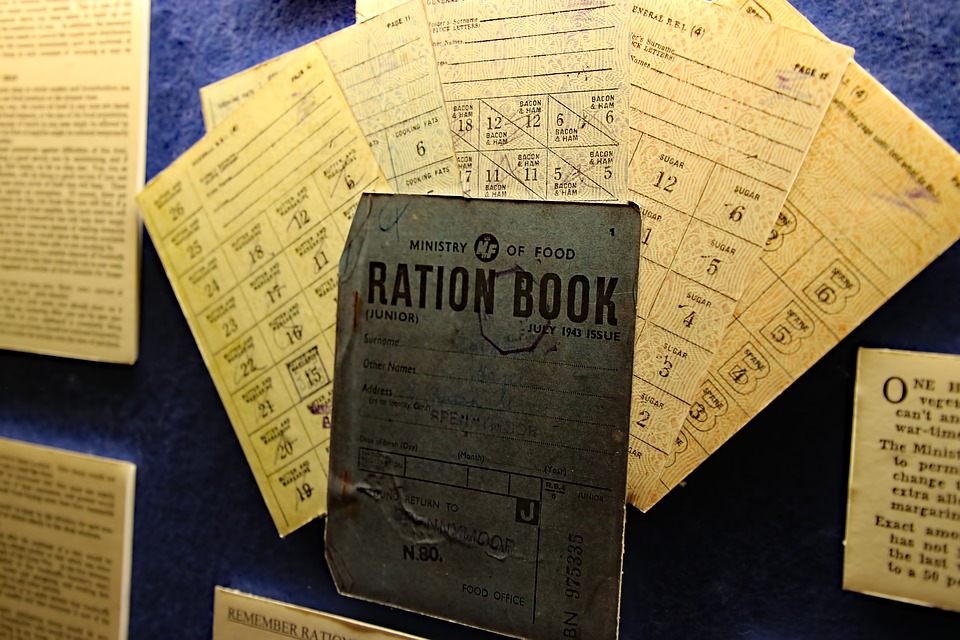


After years of Occupation, Jersey’s supplies had dwindled as the German strategy to starve Britain into submission took hold.
On 30 December 1944, the first ship carrying precious Red Cross cargo docked in Jersey’s harbour – bolstering the diets of islanders who had to make to do with very little throughout the Occupation years.
Local historian and Occupation specialist, Colin Isherwood, looks back on the arrival of the SS Vega and what her contents meant for the people of Jersey following some of the most difficult times in the island’s history…

Pictured: Dwindling supplies and cut rations devastated the island towards the end of the Occupation.
“At the start of World War II (1939), the United Kingdom imported approximately twenty million tons of food per year. One of the principal strategies used by the Germans was to use U-Boats to attack the food shipments bound for the United Kingdom, potentially threatening to starve the nation into submission.
To deal with sometimes extreme shortages, the Ministry of Food introduced a system of rationing. To buy rationed items, each person had to register at chosen shops and was provided with a ration book containing coupons. The shopkeeper was provided with enough food for registered customers. Purchasers had to take ration books with them when shopping, so the relevant coupon or coupons could be used.
Immediately prior to the German invasion of the Channel Islands, Jersey had formed the Superior Council, headed by the Bailiff, Alexander Coutanche. In Guernsey the Controlling Committee had been established under the presidency of H.M. Procureur, Ambrose Sherwill. These two island Governments administered the two Bailiwicks throughout the entire Occupation, ensuring the population had food and were in good health.

Pictured: Cut off from supplies, the first aid boat didn't arrive in Jersey until 30 December 1944.
There was no immediate shortage of food after the invasion, however the Islands were not self-supporting; relying on supplies from the United Kingdom. In 1939 Guernsey’s food imports amounted to over sixteen thousand tons, with Jersey importing close to twenty thousand tons.
Within the first few weeks of Occupation, representatives from the Islands travelled under escort to France to buy supplies. John Jouault from Jersey and Raymond Falla from Guernsey established a suitable base in which to operate in Granville.
John Jouault and Raymond Falla worked hard to obtain food and essential commodities for the civilian population of the islands. The commission continued to operate in Granville until the Allied invasion of France in June 1944; when it moved to St. Malo.
On the 18 August 1944 the German armed forces in St. Malo had surrendered to the Americans. This was the last trading port for the Channel Islands, all trade links to France were severed, leaving the islands in a Siege period.
At this time basic civilian rations for a week had been reduced to: 2ozs butter or margarine, 7ozs flour, 3ozs sugar, 1ozs salt, 4ozs meat, 5ozs bread. Substitute foods were essential to try and bolster these ever-dwindling rations.
Tea was made from carrots or nettle leaves. Coffee from parsnips. Sultanas and currants were made with dried sugar beet and salt from sea water. The average person in England at this time was consuming 3,500 calories per day, whereas people in the Channel Islands could only consume 1,137 calories. This figure dropped to as low as 900 calories just prior to the arrival of the Red Cross parcels.
In October 1944, Alexander Coutanche, the Bailiff of Jersey and Victor Carey, the Bailiff of Guernsey appealed to the German authorities to allow the Red Cross to deliver food consignments for the civilian population to the Channel Islands.
On 8 December 1944 the following announcement was made to the civilian population of Jersey by Alexander Coutanche: “I am officially informed by the German Military Authorities that a Red Cross ship was, weather permitting, due to leave Lisbon on Thursday, 7 December, for the Channel Islands. The ship will call at Guernsey first en route for Jersey.”
In the late evening of Wednesday 27th December 1944, the International Red Cross vessel the SS Vega arrived at St. Peter Port Harbour Guernsey. Unloading commenced at noon on Thursday 28 December.
On Saturday 30 December, the SS Vega arrived in Jersey, berthing at the end of the Albert Pier in St. Helier Harbour at 5.45pm. Sadly, few people saw her arrive as the ships arrival time had not been confirmed and was subject of much rumour which seemed to change frequently and to hinder matters it was also dark.
The task of unloading the parcels in Jersey began on Sunday 31st December, as with Guernsey; the Kriegsmarine (German Navy) unloaded the cargo before being passed to the St. John Ambulance.

Pictured: Colin gave a talk at Jersey Library on the Vega on its 75th anniversary.
This first voyage of Red Cross supplies had brought to the islands: 119,792 standard food parcels, 4,200 invalid diet parcels, four tonnes of soap, five tonnes of salt, 96,000 cigarettes medical supplies and a small quantity of children’s clothing.
35 members of the St. John Ambulance association helped with the transportation of the Parcels to Martlands store in Patriotic Street (now a multi-storey car park) which was used as a sorting area prior to distribution.
Each Red Cross parcel weighed approximately nine pounds and 12 ounces and was intended to provide a person with 462 calories per day to increase their existing rations and substitute foods; but it was not until the third visit by the SS Vega that the supplies of flour and yeast arrived.
From late January 1945 until mid-February 1945 the islands population had been with little or without anybread. The Red Cross flour and yeast helped to add another 987 calories to their daily diet.
Between December 1944 and May 1945 the Vega made five voyages; one further trip was made in June 1945. In August 1945, the Vega travelled to London to be re-painted; having her Red Cross insignia removed. The Vega was finally broken up for scrap in 1954 in Travemunde Germany.”
Comments
Comments on this story express the views of the commentator only, not Bailiwick Publishing. We are unable to guarantee the accuracy of any of those comments.